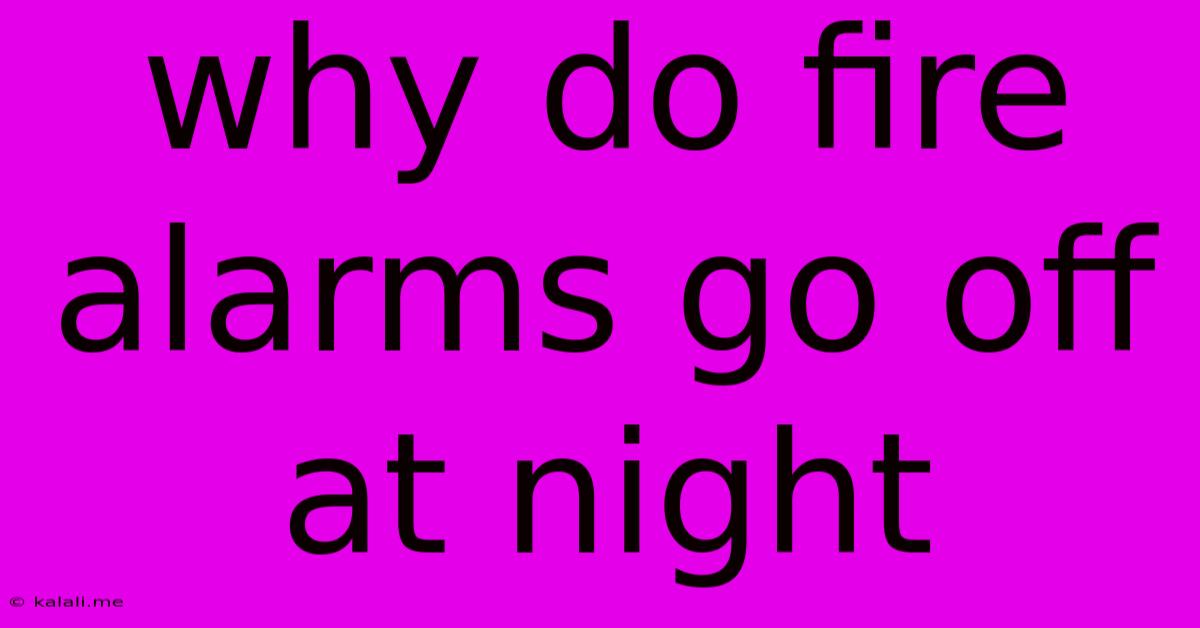Why Do Fire Alarms Go Off At Night
Kalali
Jun 08, 2025 · 3 min read

Table of Contents
Why Do Fire Alarms Go Off at Night? A Comprehensive Guide
Meta Description: Discover the common reasons why your fire alarm might sound in the middle of the night, from dust buildup and faulty batteries to actual emergencies. Learn how to troubleshoot and prevent future nighttime alarms.
Nighttime fire alarms can be jarring, disruptive, and even frightening. That piercing shriek in the quiet hours can leave you wondering what caused it and what to do next. While the immediate thought is a fire, there are several reasons why your smoke alarm might activate at night, some more serious than others. Understanding these causes can help you address the problem and sleep soundly.
Common Causes of Nighttime Fire Alarms
Several factors contribute to the unwelcome sounds of a fire alarm in the dead of night. Let's break them down:
-
Dust and Debris Buildup: This is perhaps the most common culprit. Over time, dust, cobwebs, and other airborne particles can accumulate inside the smoke detector. This debris can interfere with the sensor, triggering a false alarm, especially in the stillness of the night. Regular cleaning is crucial.
-
Low Battery: A low battery signal is often indicated by a chirping sound. However, a failing battery can also cause erratic behavior and unintended activations, especially at night when temperatures can fluctuate. Replacing batteries regularly (at least once a year, or as recommended by the manufacturer) is essential preventative maintenance.
-
Humidity and Moisture: Excessive humidity or moisture can affect the sensor's sensitivity. Steam from showers, cooking, or even condensation can trigger a false alarm, particularly in bathrooms or kitchens. Proper ventilation is important.
-
Cooking Smoke or Steam: While this is more likely to occur during cooking hours, lingering smoke or steam from late-night cooking can sometimes trigger a smoke alarm. Ensure adequate ventilation while cooking and clean any lingering residue promptly.
-
Insects: Insects can nest inside the smoke alarm, causing interference. This is less common but should be considered if you notice unusual activity around the alarm.
-
Actual Fire: Let's not forget the most important reason: an actual fire. While less frequent, it is crucial to always take a nighttime alarm seriously. Immediately evacuate the building and contact emergency services.
Troubleshooting Your Nighttime Alarm
Before jumping to conclusions, systematically check these points:
- Check the Batteries: Replace any low or depleted batteries.
- Inspect for Dust and Debris: Carefully clean the smoke alarm using a vacuum cleaner with a brush attachment or a soft-bristled brush.
- Check for Moisture: Look for signs of water damage or condensation. If present, allow the area to dry completely before reinstalling the alarm.
- Test the Alarm: Press the test button to ensure it's functioning correctly. A consistent beep indicates proper operation.
- Check for Nearby Sources of Smoke or Steam: Investigate any recent cooking activities or other potential sources of smoke.
Preventing Future Nighttime Alarms
Proactive measures can significantly reduce the likelihood of unwanted nighttime alarms:
- Regular Cleaning: Clean your smoke alarms at least once every three months.
- Battery Replacement: Replace batteries at least once a year, or according to the manufacturer's recommendations. Consider using long-life batteries.
- Proper Ventilation: Ensure adequate ventilation in your home to prevent humidity buildup.
- Careful Cooking Practices: Use exhaust fans while cooking and clean up any lingering smoke or grease.
- Regular Inspections: Regularly inspect your smoke alarms for any signs of damage or malfunction.
By understanding the common causes of nighttime fire alarms and taking preventative measures, you can greatly reduce the chances of experiencing these disruptive and sometimes frightening events. Remember, while a false alarm is inconvenient, the early warning of a real fire is invaluable. Always prioritize safety.
Latest Posts
Latest Posts
-
How To Remove Glue From Hardwood Floor Installation
Jun 08, 2025
-
The Installer Information On The Recovery Server Is Damaged
Jun 08, 2025
-
Are Columns Nullable By Default Mysql
Jun 08, 2025
-
Is Project X Movie Based On A True Story
Jun 08, 2025
-
How To Secure A Door That Opens Outward
Jun 08, 2025
Related Post
Thank you for visiting our website which covers about Why Do Fire Alarms Go Off At Night . We hope the information provided has been useful to you. Feel free to contact us if you have any questions or need further assistance. See you next time and don't miss to bookmark.